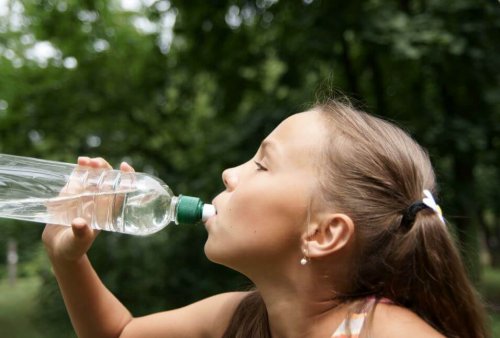Nutrition For Young Athletes

Young athletes who follow a nutritious and healthy diet can benefit immensely. If your child is practicing a sport, you must take some important aspects into account; some of them are related to the child’s diet, which helps them improve their performance and overall wellbeing.
The most important aspect to keep in mind: hydration
The priority should be hydration, whether your young athlete is being active for a short period of time or for longer. If your child has to practice for long periods of time, hydration will be even more essential for their performance.
Make sure your child is drinking water every 15 minutes. It isn’t always easy, but you have to try to encourage them to drink.

The main source of hydration should be water and only in exceptional circumstances, such as during hot days we recommend that you give them beverages that contain about 0.5 to 1.0 mg of sugar per milliliter.
Try to avoid giving them energy drinks: they’re usually high in calories, due to their sugar content. Children can quickly become used to these, which makes it more difficult for them to drink just water.
There are some healthy options available, which also contain electrolytes. Just make sure they’re low in sugar.
The importance of the caloric intake of young athletes
It’s obvious that young athletes will need a higher caloric intake than sedentary children. In general, an active child must eat healthily to make sure that they have proper glycogen levels. This is a source of energy that is stored in their organs, such as the liver and muscles. By following a diet tailored to their needs, not only will they be able to perform at their maximum potential, they’ll also have enough nutrients for their development and growth.

According to the Spanish Pediatrics Association (AEP), the distribution of macro and micronutrients isn’t really that different from the general recommendation for children and teenagers: 50 percent of their caloric intake must come from carbohydrates, 12-15 percent from protein and 30-35 percent from fat.
Before intense activity
Your child should leave enough time for their body to digest the foods they ate before getting into action. Before intense activity, it’s better if they eat carbohydrates such as pasta, rice, bread and fruit.
Similarly, they must avoid eating or drinking foods high in added sugars. Although these foods cause blood sugar spikes, after a short period of time they lower the blood glucose levels, which then affects their performance during an intense activity.
If the activity has a long duration, it’s important that your child is eating carbohydrates throughout the activity. Keep this in mind, especially for activities that last more than one hour.

After intense activity
Right after your young athlete is finished with their practice, make sure they restore their energy reserves. This is the perfect time to recover their glycogen levels, given that the body is ready to synthesize it from the glucose they’re eating. We recommend that they eat again after two to four hours.
Essential micronutrients in the nutrition of young athletes
The two most important nutrients in the diet of a young athlete are calcium and iron.
Calcium helps to strengthen the bones, something specially important in high-impact activities. In addition, this mineral is also key in nerve impulses.
Then we have iron; low levels of this nutrient cause fatigue and tiredness, so making sure your young athlete is getting enough of it will help with their performance and resistance. Iron is also fundamental to transporting oxygen in red blood cells and sports require high quantities of it.
Pay close attention to the nutrition of your kids, especially if they’re very active or practice a sport daily. The importance of a healthy diet while living an active lifestyle increases when it comes to young athletes. They’re going through a critical developmental stage in their lives.
Young athletes who follow a nutritious and healthy diet can benefit immensely. If your child is practicing a sport, you must take some important aspects into account; some of them are related to the child’s diet, which helps them improve their performance and overall wellbeing.
The most important aspect to keep in mind: hydration
The priority should be hydration, whether your young athlete is being active for a short period of time or for longer. If your child has to practice for long periods of time, hydration will be even more essential for their performance.
Make sure your child is drinking water every 15 minutes. It isn’t always easy, but you have to try to encourage them to drink.

The main source of hydration should be water and only in exceptional circumstances, such as during hot days we recommend that you give them beverages that contain about 0.5 to 1.0 mg of sugar per milliliter.
Try to avoid giving them energy drinks: they’re usually high in calories, due to their sugar content. Children can quickly become used to these, which makes it more difficult for them to drink just water.
There are some healthy options available, which also contain electrolytes. Just make sure they’re low in sugar.
The importance of the caloric intake of young athletes
It’s obvious that young athletes will need a higher caloric intake than sedentary children. In general, an active child must eat healthily to make sure that they have proper glycogen levels. This is a source of energy that is stored in their organs, such as the liver and muscles. By following a diet tailored to their needs, not only will they be able to perform at their maximum potential, they’ll also have enough nutrients for their development and growth.

According to the Spanish Pediatrics Association (AEP), the distribution of macro and micronutrients isn’t really that different from the general recommendation for children and teenagers: 50 percent of their caloric intake must come from carbohydrates, 12-15 percent from protein and 30-35 percent from fat.
Before intense activity
Your child should leave enough time for their body to digest the foods they ate before getting into action. Before intense activity, it’s better if they eat carbohydrates such as pasta, rice, bread and fruit.
Similarly, they must avoid eating or drinking foods high in added sugars. Although these foods cause blood sugar spikes, after a short period of time they lower the blood glucose levels, which then affects their performance during an intense activity.
If the activity has a long duration, it’s important that your child is eating carbohydrates throughout the activity. Keep this in mind, especially for activities that last more than one hour.

After intense activity
Right after your young athlete is finished with their practice, make sure they restore their energy reserves. This is the perfect time to recover their glycogen levels, given that the body is ready to synthesize it from the glucose they’re eating. We recommend that they eat again after two to four hours.
Essential micronutrients in the nutrition of young athletes
The two most important nutrients in the diet of a young athlete are calcium and iron.
Calcium helps to strengthen the bones, something specially important in high-impact activities. In addition, this mineral is also key in nerve impulses.
Then we have iron; low levels of this nutrient cause fatigue and tiredness, so making sure your young athlete is getting enough of it will help with their performance and resistance. Iron is also fundamental to transporting oxygen in red blood cells and sports require high quantities of it.
Pay close attention to the nutrition of your kids, especially if they’re very active or practice a sport daily. The importance of a healthy diet while living an active lifestyle increases when it comes to young athletes. They’re going through a critical developmental stage in their lives.
This text is provided for informational purposes only and does not replace consultation with a professional. If in doubt, consult your specialist.








